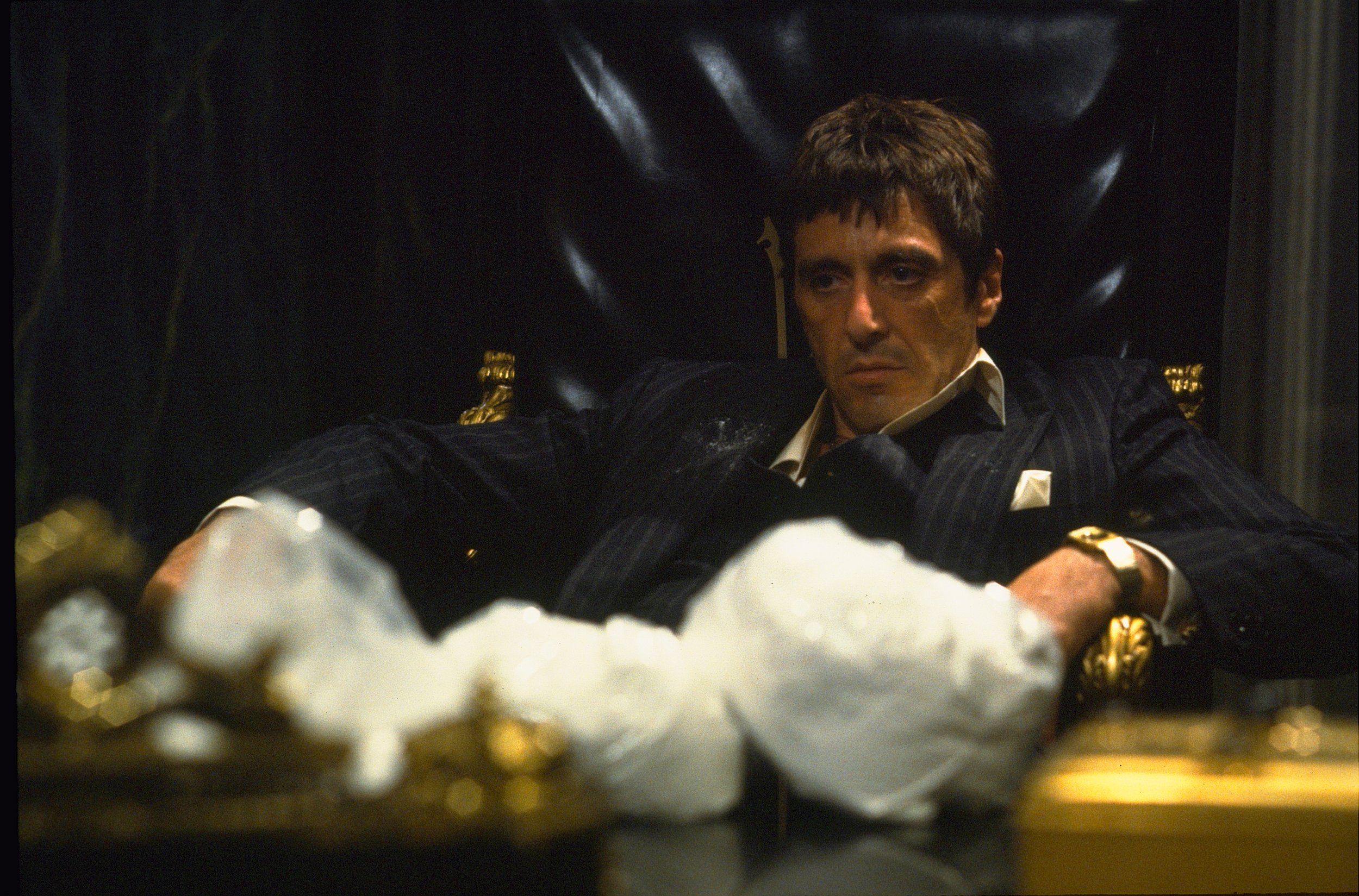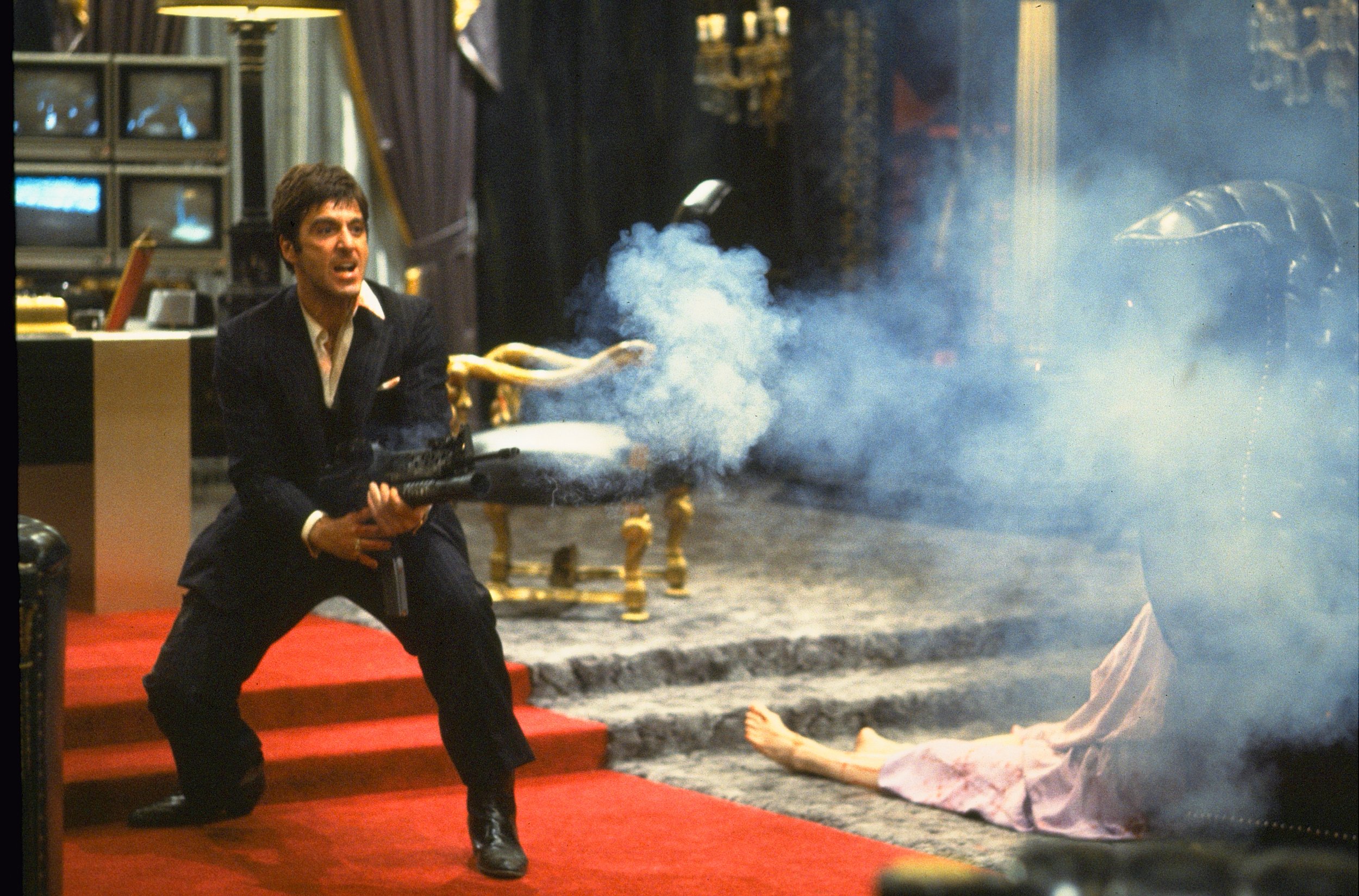Scarface (1983)
Director: Brian De Palma
Starring: Al Pacino, Michelle Pfeiffer, Steven Bauer, Mary Elizabeth Mastrantonio
Primary genre: Crime
Secondary genre: Drama
Brian De Palma’s “Scarface”, one of the quintessential films of the 80s, is worshipped by every major hip hop/rap star and used as a savoir vivre template by gangsters (no, seriously). At its heart and time of release in the early 80s, it dealt with the Cuban immigration wave that engulf much of Florida but first and foremost, this highly quotable Oliver Stone written flick describes the rise and fall of a notorious drug lord in the face of Tony Montana.
Al Pacino plays an Cuban ex-convict who seeks to capture the American dream in the land of opportunity in any way (and means) possible; dissing his honest work as a barrier for something greater, he chooses to reach the top by trafficking cocaine. Stone’s screenplay presents a harsh reality for political refuges but avoids (surprisingly) to make a strong political statement. This is Tony’s story through his own point of view which justifies pretty much every horrific act he commits on his journey to hell. Even when he shows some unexpected shades of compassion, this impulsive and gradually corrupted by his own power individual becomes a vacuum that sucks dry any existing goodwill. His Roman emperor inspired mansion feels like a prison of his own making, a Dante inspired hell filled with crimson carpets and black marbles an ideal décor for a volatile king of a desolate and joyless land who yields carelessly his power.
Nevertheless, the film never points its finger to Tony nor resorts to any sort of moral preaching much to the displeasure of cine-afficionados who campaigned against this violence glorification. Stone suggests that Tony is the end product of two wildly unorthodox systems; In Cuba he had no rights while in the US he barely makes a living. Thus when he puts to test his two remarkable traits - brutal honesty and loyalty - what initially seems to start paying off eventually leads to his downfall. Pacino is a superlative acting symphony on his own, providing fantastic mannerisms to his anti-hero (or villain depending where you are coming from) and enough passive aggressiveness to make real mafiosos cry.
Bearing the structure of a character study with a vast supporting cast reflecting intriguing layers to Tony’s explosive personality (e.g., lust, contempt, respect, ambition, greed), “Scarface” is a dizzying crime drama that captures perfectly the cultural zeitgeist during the cocaine and drug cartel explosion of the late 70s and early 80s. By the time we reach the infamous climax, we realize (perhaps unapologetically) that every action has a consequence and all the money and power in the world cannot unseal your fate. The world is yours but this is not a mutual sentiment.
De Palma brings remarkable style into this tale of continuous corruption with long takes and several suspenseful moments (e.g., the hotel scene) although the depiction of violence could shock some due to its rawness. At the hands of a less competent director, this could have a straight to video entry, an emphasized to action cliches and tropes vehicle chomping a piece from the 80s cocaine cinema hysteria. Yet, “Scarface” remains fresh after all these years and despite a three hour running time, De Palma maintains interesting ways to offer a steady momentum.
“Scarface” might not be very subtle but it’s intimate portrayal of a lost soul albeit on the grand scale that illegal funds can provide is truly captivating. Al Pacino is iconic for sure but it is De Palma’s direction which keeps things intriguing even during the inevitable final outcome. A landmark of the genre rightfully so, it is simply not to be missed.
Say hello to my little friend!
+Pacino is sensational
+Fascinating protagonist
+Strong supporting work
+Captivating tale of personal corruption
+Highly stylized
+Suspenseful
-Violence might turn people off
-Could be seen as a glorification of crime




